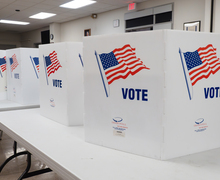Liberal : Religious faith offers poor substitute for educated policy making
In the race for the Republican presidential nomination, religion is playing a role in how candidates define themselves. Religion has arguably affected presidential races in some form throughout American history. Yet some candidates for the GOP nomination seem to be letting religion have a fair deal of influence over views on policy.
Michelle Bachmann and Rick Perry stand out as examples of candidates who let religion influence policy formation. No other major candidates are nearly as overt in their perspectives.
In the case of Bachmann, Liberal political analysts quickly scolded her recent comments regarding Hurricane Irene and the overhyped east coast earthquake: ‘I don’t know how much God has to do to get the attention of the politicians,’ she said. ‘We’ve had an earthquake; we’ve had a hurricane. He said, ‘Are you going to start listening to me here?” Analysts ignored how lightly the lines were delivered as well as the laughing audience in the background.
But Bachmann’s real religiously inspired politics are far more unsettling. In 2007, as a member of the House of Representatives, Bachmann co-sponsored H.R. 847, titled ‘Recognizing the Importance of Christmas and the Christian Faith.’ The bill states that America is composed mainly of Christians. Because of this, the bill directs that the House ‘recognizes the Christian faith as one of the great religions of the world’ and ‘acknowledges and supports the role played by Christians and Christianity in the founding of the United States and in the formation of the Western civilization.’
This egregious legislation asks the federal government to declare one religion to be particularly superior. Using the U.S. government to promote a particular religion, even for purely inconsequential purposes, demonstrates Bachmann’s ignorance about the proper relationship between religion and government.
Rick Perry, considered the GOP nominee frontrunner, also has dabbled in mixing religion with policy. In a video inviting Americans to a prayer rally he recently hosted, he said, ‘With the economy in trouble, communities in crisis and people adrift in a sea of moral relativism, we need God’s help. That’s why I’m calling on Americans to pray and fast, like Jesus did and as God called the Israelites to do in the book of Joel.’
Perry shows that he believes the problems facing his state and his country are somehow out of his control. Individuals who point to Perry as a job creator fail to note that Texas’ debt continues to rise at a rate faster than the United States’ debt. Perry’s default to religion reveals a leader who won’t accept blame for his own actions. Rather than taking measures to fix his state’s poor education system, economy and health care, he looks to God for assistance.
Adding to Rick Perry’s religious and political background is his stance on allowing intelligent design, or creationism, to be taught in schools: ‘I am a firm believer in intelligent design as a matter of faith and intellect, and I believe it should be presented in schools alongside the theories of evolution.’
Regardless of personal feelings on creationism, the topic is not scientific. It is an exclusively religious concept and lacks any logic or academic merit. Although the Supreme Court ruled requiring that schools teach creationism is unconstitutional, Perry found it acceptable, even exemplary, that schools in Texas voluntarily teach the subject.
If Americans value a government based on intellectual, rational thought, Rick Perry and Michelle Bachmann are not viable candidates. Some may argue that America was partly founded on Christian principles, but this is not expressed directly in the United States’ founding documents.
Some voters may agree with Perry and Bachmann’s religious beliefs. But if voters compare the two candidates’ views to the fundamental principles that define America, they will find Perry and Bachmann’s views unacceptable. The president and the country do not need to endorse a particular faith to make wise, calculated decisions.
Harmen Rockler is a junior political science and newspaper journalism major and his column appears weekly. He can be reached at horockle@syr.edu.
Published on September 5, 2011 at 12:00 pm





